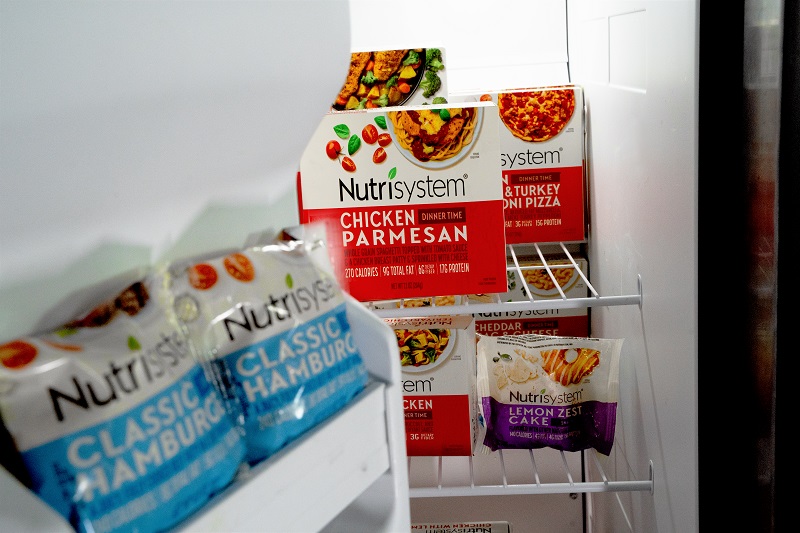7 Effective Strategies For Losing Weight After 40
Article posted in: Diet & Nutrition Experts’ Corner
Do you feel like you gain weight just by looking at food now that you’re in your 40s? Are the weight loss tricks from your 20s not working as well anymore?
Well, here’s the deal: you are not the same person in your 40s that you were in your 20s. For the most part, that’s a good thing. But, just like you wouldn’t wear the same clothes or hairstyle as you did in your 20s, your weight loss game needs an update to match your current lifestyle and body.
Here’s what you need to know for successful weight loss after 40.
Why is it Harder to Lose Weight After 40?
Let’s start by understanding what makes it feel harder to lose weight after 40.
First, your metabolic rate tends to slow with age. Estimates show about a seven to eight percent decrease in your resting metabolic rate between the ages of 40 and 60. In other words, if your body burned 1200 calories at rest in your 20s, it’s only burning about 1100 calories daily after 40.
One key reason for this metabolic downshift is a change in muscle mass. Muscle mass naturally starts to decline after age 30, and since muscles burn calories, losing them means fewer calories are burned daily. But there’s good news: you can take steps to keep your muscles strong and calorie-burning throughout your life (we’ll cover that later).
Next, your 40s come with unique lifestyle changes that can impact your waistline. While there’s much to enjoy about this decade, like increased self-confidence and an active family life, it’s also a uniquely busy time. Balancing it all can lead to sleepless nights, stress and less time for physical activity, affecting your ability to lose and maintain weight.
Finally, hormonal changes accompany this stage of life, especially for those approaching menopause who will experience a drop in estrogen. Lower estrogen levels affect your appetite, blood sugar management and how your body stores fat.
The key takeaway here is that your 40s come with unique challenges, requiring new approaches to optimize your health and make the most of this decade. Here are seven of the most effective strategies to help you lose weight in your 40s.
Essential Strategies for Successfully Losing Weight After 40
1. Commit To A Strength Training Routine

A consistent strength training routine is more important at this time of life than the miles you log on the treadmill. Remember, maintaining strong muscles is key to keeping your metabolism burning, among other benefits.
This doesn’t mean you have to hit the gym and lift heavy six days a week. Just two days a week of 30-minute resistance training can positively impact your body composition and waistline.
Since you’re busy, try circuit training, which combines cardio and strength training to get the most out of your time. Schedule time on your calendar and treat it like any other important appointment. Joining a class or partnering up with a friend can help you stay accountable.
2. Boost Your Protein Intake

In addition to strength training, eating plenty of protein will keep your muscles healthy and active. Aim for around 1.2 grams of protein per kilogram of body weight daily, which most people can achieve by getting 25 to 30 grams of protein at each meal and 10 to 15 grams at each snack.
Look for lean protein choices like egg whites, chicken, turkey, low-fat Greek yogurt, cottage cheese, tuna, shrimp, tofu and edamame.
Protein shakes can help you top up your protein levels and are especially helpful to replenish your muscles after a strength training routine. Look for options low in added sugars made with complete proteins (i.e., whey, casein, egg white, soy). Don’t forget to account for them in your daily calorie intake.
3. Focus on Complex Carbs

Carbohydrates can quickly affect your blood sugar levels, and poor blood sugar management can lead to fat storage. Optimizing your diet to avoid blood sugar spikes is particularly important in your 40s when other factors influencing blood sugar management, like hormonal changes, are in play.
Despite common diet folklore, you don’t need to cut carbs from your diet to keep blood sugars in check. Studies consistently show no difference in weight loss between low-carb and moderate-carb diets. Plus, skipping carbs means missing fiber, vitamins and minerals that help manage your appetite and keep you healthy.
What is important are the types of carbohydrates you include in your diet. Low-glycemic index carbohydrates promote steady blood sugar levels after meals and throughout the day. These include whole grains, fruits, vegetables and legumes.
You can also reduce a meal’s glycemic load (aka the blood sugar impact) by pairing carbohydrate foods with fiber and protein-rich foods. Try these combinations:
- Pretzels with hummus
- Apples with peanut butter
- High-protein pancakes
- Cereal with a side of egg whites
- Pasta with plenty of veggies and lean chicken sausage
- Pineapple with low-fat cottage cheese
4. Limit Alcohol

Whether it’s a client dinner, co-worker happy hour or mom’s night out, it can feel like alcohol is an unavoidable part of your social scene. You may have noticed you don’t bounce back from a binge like your younger self, and this includes your body’s ability to process and store the excess calories from alcohol.
Still, it’s possible to maintain a healthy social life while keeping alcohol in check. One of the simplest ways is to drink more water. Commit to finishing a glass of water after each alcoholic drink and before ordering your next one. Doing this will help you slow down your alcohol intake and keep you hydrated, so you wake up feeling refreshed.
If you’re worried about peer pressure, a plain seltzer with lime is just as hydrating as water and looks like a vodka tonic. You can also choose drinks with a lower alcohol content – wine spritzers, vodka tonic in a tall glass and light beer all fit the bill.
5. Manage Stress

During your 40s, not only do you have increasing work demands, but you also have to keep up with mounting financial obligations, kid’s schedules, aging parents, household needs and more.
While many of these things add joy and purpose to your life, they can also add an unhealthy dose of stress. Chronic, unmanaged stress raises the hormone cortisol, resulting in stubborn fat accumulation, particularly around your midsection. Beyond being uncomfortable, carrying excess weight at your waistline raises your risk of developing diabetes and heart disease.
Meditation, journaling, and talking about life’s pressures with someone are all strategies that can keep your stress manageable.
6. Improve Your Sleep Habits

Skipping sleep can seem like the only option when you’re trying to fit everything in. However, sleep deprivation messes with your hunger hormones, increasing cravings and calorie intake.
Try to create habits that improve your sleep routine, aiming for at least seven hours each night. This can include:
- Committing to a consistent bedtime and wake time
- Turning off screens at least one hour before bedtime
- Investing in tools to help you fall and stay asleep (i.e., comfortable bedding, room darkening shades, noise machines, eye masks)
7. Get Help

Don’t assume you need to figure all this out alone. Look for resources that make it easy to make the adjustments necessary to improve your health in your 40s and beyond.
For example, Nutrisystem plans are perfect for busy adults. They ensure your nutrition is on point, providing the right balance of fiber, protein and low-glycemic index carbs. Plus, Nutrisystem delivers ready-to-eat meals straight to your doorstep, saving you from the hassle of meal prep and helping you achieve results.
It’s also always a great idea to keep in touch with your healthcare provider, who will help you determine the best way to meet your health goals at each stage of life.
Conclusion
Losing weight after 40 demands a fresh approach due to metabolic changes and shifting lifestyles. Prioritize strength training and protein intake to maintain muscle and opt for complex carbs to stabilize blood sugar.
Limiting alcohol, managing stress and improving sleep habits will further help control cravings and calorie intake.
Seek supportive resources, like structured meal plans from Nutrisystem, and consult your healthcare provider for guidance.
These strategies will help you embrace this life phase with confidence, ensuring a vibrant and fulfilling life in your 40s and beyond.
References
- Henry CJ. Basal metabolic rate studies in humans: measurement and development of new equations. Public Health Nutr. 2005;8(7A):1133-1152. doi:10.1079/phn2005801
- Pontzer H, Yamada Y, Sagayama H, et al. Daily energy expenditure through the human life course. Science. 2021;373(6556):808-812. doi:10.1126/science.abe5017
- Kapoor E, Collazo-Clavell ML, Faubion SS. Weight Gain in Women at Midlife: A Concise Review of the Pathophysiology and Strategies for Management. Mayo Clin Proc. 2017;92(10):1552-1558. doi:10.1016/j.mayocp.2017.08.004
- Pieczyńska A, Zasadzka E, Trzmiel T, Pyda M, Pawlaczyk M. The Effect of a Mixed Circuit of Aerobic and Resistance Training on Body Composition in Older Adults-Retrospective Study. Int J Environ Res Public Health. 2021;18(11):5608. Published 2021 May 24. doi:10.3390/ijerph18115608
- Leidy HJ, Clifton PM, Astrup A, et al. The role of protein in weight loss and maintenance. Am J Clin Nutr. 2015;101(6):1320S-1329S.
- Naude CE, Brand A, Schoonees A, Nguyen KA, Chaplin M, Volmink J. Low-carbohydrate versus balanced-carbohydrate diets for reducing weight and cardiovascular risk. Cochrane Database Syst Rev. 2022;1(1):CD013334. Published 2022 Jan 28. doi:10.1002/14651858.CD013334.pub2







